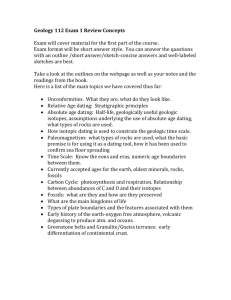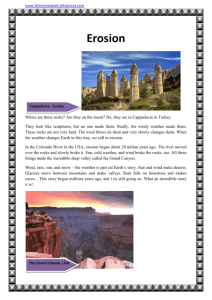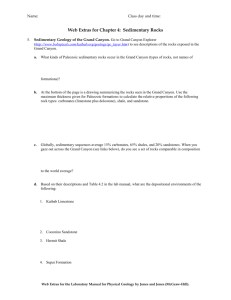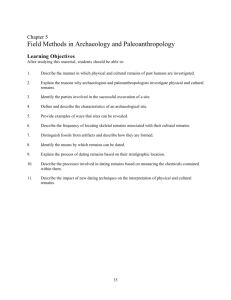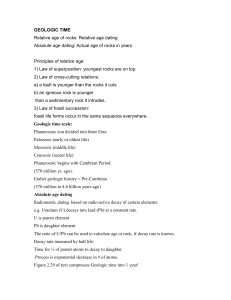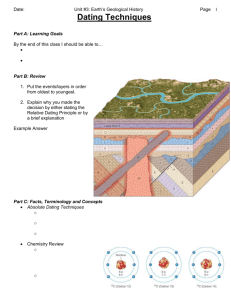Geochronology - The Grand Canyon Association
advertisement
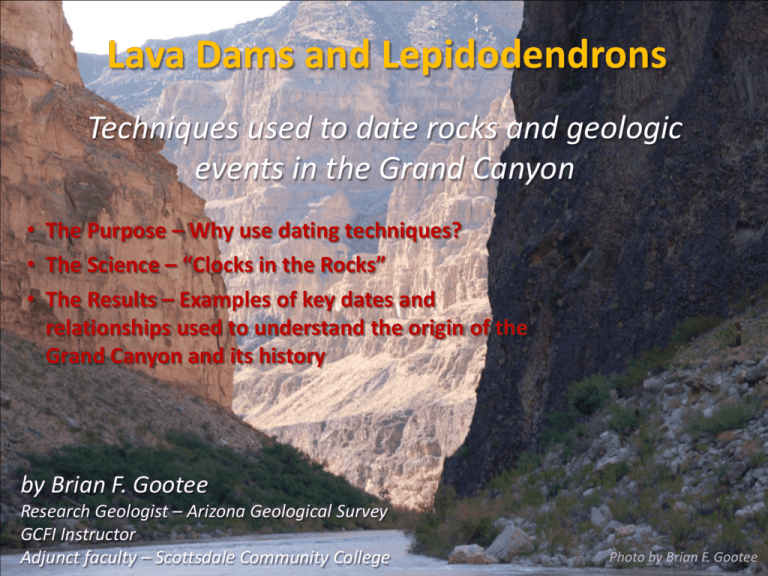
Lava Dams and Lepidodendrons Techniques used to date rocks and geologic events in the Grand Canyon • The Purpose – Why use dating techniques? • The Science – “Clocks in the Rocks” • The Results – Examples of key dates and relationships used to understand the origin of the Grand Canyon and its history by Brian F. Gootee Research Geologist – Arizona Geological Survey GCFI Instructor Adjunct faculty – Scottsdale Community College Photo by Brian F. Gootee Questions beget Questions How do we know how old those rocks are? How old is the Grand Canyon? How did the Grand Canyon form? How old is the Colorado River? “Geologic Clocks” in the Rocks Incremental dating (tree rings, lake deposits, ice, etc.) Radioactive decay Fission track Magnetostratigraphy Tephra correlation Cosmogenic nuclide dating What is radioactive dating? • It is a technique used to measure the amount of radioactive decay of certain isotopes within a rock. • An isotope is a species of an element, e.g. Carbon has 15 species! • An isotope can be stable or unstable. Unstable ones decay • Popular isotopes known to decay include: – U238 Pb207 • • • • Ar40 Ar39 C14C12 – Parent isotope daughter isotope The clock starts when atoms crystallize from magma into minerals to make an igneous rock. Isotopes are locked inside crystals when magma solidifies. And parent isotopes begin to decay into daughter isotopes By measuring the ratios of parent to daughter isotopes, one can determine the age of the mineral Ages such as 1,840 ± 1 million years are achievable What can be dated? IGNEOUS ROCKS AND THEIR MINERALS Zircon Photo by Carl Zeiss Monazite Apatite Parents & Their Daughters Over time, parent atoms decay & daughter atoms accumulate all parent atoms (one half-life) (two half-lives) more daughter atoms time Radioactive Decay Time Example: for an isotope with a half-life of 5,730 years (Carbon-14) # of atoms Parent Daughter P:D ratio Animal dies and decays 1000 (100%) 0 (0%) - After 5,730 years (1 HL) 500 (50%) 500 (50%) 1:1 After 11,460 (2 HL) 250 (25%) 750 (75%) 1:3 After 17,190 (3 HL) 125 (12.5%) 875 (87.5%) 1:7 After 57,300 yrs (10 HL) 1 (<1%) 999 (>99%) 1:999 What Does An Isotopic Date Tell Us? Can you date this rock? Can you date this rock? Yes. No. What Does An Isotopic Date Tell Us? Can radioactive dating tell us the age of this sedimentary rock? This does NOT tell us the age of the ROCK! Example: detrital zircon analysis Zhao and others, 2004 Dickinson and Gehrels, 2003 Dating Pros ….….. and …...... Cons • A reliable age • Accurate (<1 – 10 %) • Methods in tandem provide the best solution • Brackets geologic events, including fossils • Consilience • Loss of daughter • Gaining >1 parent • Inherent problems within the sample • Expensive $$$ • Flawed assumptions • Misinterpretation Intermission & Poll Dating the Grand Canyon • Lava Dams at Vulcans Throne • Dating the oldest rocks in the Canyon • What about all the fossils? • DZ work in Yuma • 4.8 Ma tephra Lava Dams below Vulcans Throne “What a conflict of water and fire there must have been here! Just imagine a river of molten rock running down a river of melted snow. What a seething and boiling of waters, what clouds of steam rolled into the heavens!" John Wesley Powell, August 25, 1869 Photo by Brian F. Gootee Photo by Balsley, J.R. Using chronology to understand process Field Observations • More than 150 individual lava flows built 13 individual lava dams across the Colorado River (~22 km3 of lava spilled into the Canyon) • At least one to five large lakes formed behind the dam, thought to have backed up as far as Moab, Utah • 5 catastrophic dam failures and resulting outburst floods • Outburst flood deposits formed up to 200 m (660 ft) above river level, as much as 53 km downstream. Boulders as large as 15 meters (50 feet) in length Geochronology • Recent Ar40/Ar39 and cosmogenic nuclide dates revised the ~1 My age to individual flows between 525,000 to 100,000 years • Dams may have formed rapidly within hours/days • Formed short-lived lakes no longer than ~10 to 100 years • Dates of lava flows also used to calculate incision rates for the Colorado River Outburst-flood deposit 165,000 +- 18,000 yr Grey Ledge flow Up river After Crowe and others, 2008 The Oldest in the Southwest? • Oldest rocks in the Grand Canyon belong to the Elves Chasm pluton, 1,840 ± 1 Ma (U/Pb) (zircons) • The younger Vishnu rocks (metamorphosed sand and mud) contain detrital zircons from an older province ~2,200 to 3,300 My age • This was the “basement” for the Vishnu • Grains in the Vishnu derived from Mohave desert area and/or Australia, China or Antarctica Elves Chasm pluton Age-Dating Fossils? • Fossils older than about 70,000 years cannot be dated …. Yet • Paleontologists study enough fossils to bracket the age of the rock. • Nearly the entire Paleozoic section from Kaibab to Tapeats is dated by correlating fossils with other places on other continents Fossilized Lepidodendron trees found in the Surprise Canyon Formation along estuary channels How old is the Colorado River? • The Colorado River empties into the Salton basin and Gulf of California, The Colorado River Delta • By dating zircon sand grains within the CR delta, you can determine the ages of source terrains which supply the detrital sands • This method allows to date the terrains within a river’s watershed, like a genetic “fingerprint” Salton basin Colorado River Delta Paleolakes – a Top-Down System • The Colorado River fed paleolakes between Lake Mead and Gulf of California • Each paleolake ended by breaching a bedrock paleodivide • Timing of these events is constrained by Ar40/Ar39 dating of an ash to 4.8 Ma • Compared with a database of over 5,000 dated ash samples • We now know that the Colorado River completed its course to the Pacific ocean 4.8 million years ago! Grand Canyon factoids • The oldest grains in the Coconino Sandstone go back as far as 3,700 million years! • In contrast, the oldest grains of sand in the base of the Supergroup (1,000 My older) is “only” 1,750 My! • The Paleozoic sequence in the Grand Canyon is almost entirely dated by correlating fossils to worldwide assemblages without numerical age dating. • Is there life on Mars? Or How old is the Grand Canyon? Questions beget Questions How do we know how old those rocks are? • • By measuring the amount of radioactive decay in rocks By measuring the amount of decay of parent isotopes into daughter isotopes within a rock How old is the Grand Canyon? • Depends on what part and depth • Between 70 and 6 Ma How did the Grand Canyon form? • Mass wasting (99%) and erosion (1%) • We don’t really know yet • From the top below Lake Mead How old is the Colorado River? • Greater than 4.8 million years Some common constraints of isotopes
